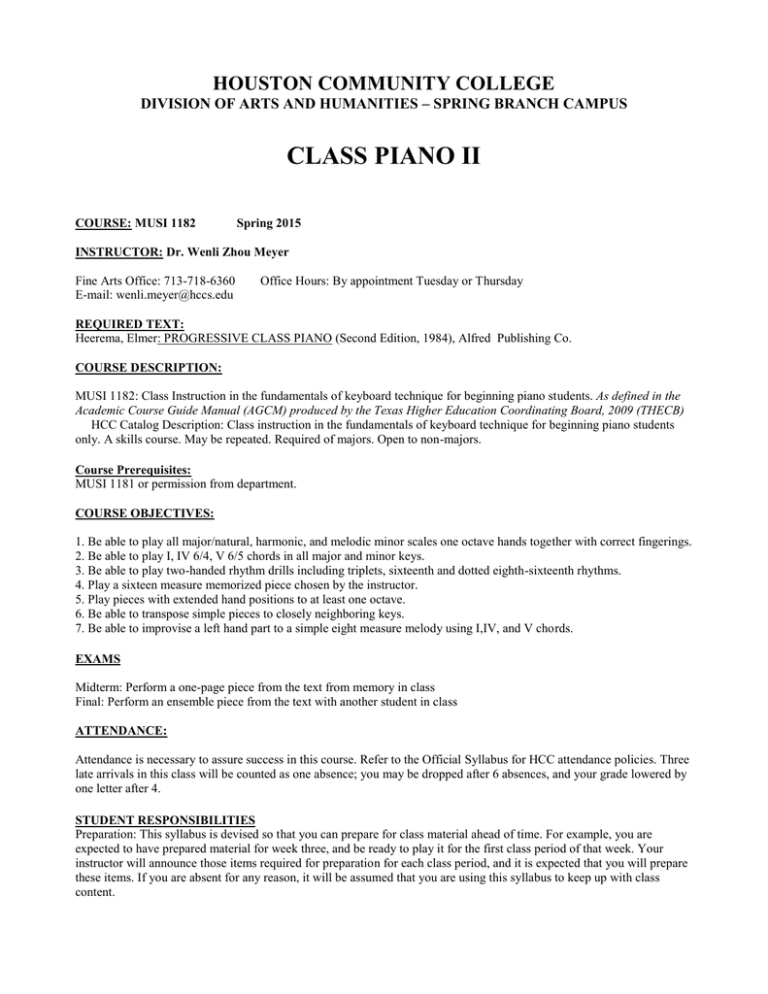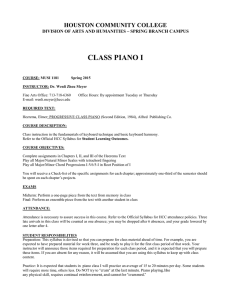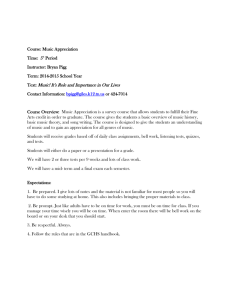MUSI 1182 HAND-OUT - spring15.doc
advertisement

HOUSTON COMMUNITY COLLEGE DIVISION OF ARTS AND HUMANITIES – SPRING BRANCH CAMPUS CLASS PIANO II COURSE: MUSI 1182 Spring 2015 INSTRUCTOR: Dr. Wenli Zhou Meyer Fine Arts Office: 713-718-6360 E-mail: wenli.meyer@hccs.edu Office Hours: By appointment Tuesday or Thursday REQUIRED TEXT: Heerema, Elmer: PROGRESSIVE CLASS PIANO (Second Edition, 1984), Alfred Publishing Co. COURSE DESCRIPTION: MUSI 1182: Class Instruction in the fundamentals of keyboard technique for beginning piano students. As defined in the Academic Course Guide Manual (AGCM) produced by the Texas Higher Education Coordinating Board, 2009 (THECB) HCC Catalog Description: Class instruction in the fundamentals of keyboard technique for beginning piano students only. A skills course. May be repeated. Required of majors. Open to non-majors. Course Prerequisites: MUSI 1181 or permission from department. COURSE OBJECTIVES: 1. Be able to play all major/natural, harmonic, and melodic minor scales one octave hands together with correct fingerings. 2. Be able to play I, IV 6/4, V 6/5 chords in all major and minor keys. 3. Be able to play two-handed rhythm drills including triplets, sixteenth and dotted eighth-sixteenth rhythms. 4. Play a sixteen measure memorized piece chosen by the instructor. 5. Play pieces with extended hand positions to at least one octave. 6. Be able to transpose simple pieces to closely neighboring keys. 7. Be able to improvise a left hand part to a simple eight measure melody using I,IV, and V chords. EXAMS Midterm: Perform a one-page piece from the text from memory in class Final: Perform an ensemble piece from the text with another student in class ATTENDANCE: Attendance is necessary to assure success in this course. Refer to the Official Syllabus for HCC attendance policies. Three late arrivals in this class will be counted as one absence; you may be dropped after 6 absences, and your grade lowered by one letter after 4. STUDENT RESPONSIBILITIES Preparation: This syllabus is devised so that you can prepare for class material ahead of time. For example, you are expected to have prepared material for week three, and be ready to play it for the first class period of that week. Your instructor will announce those items required for preparation for each class period, and it is expected that you will prepare these items. If you are absent for any reason, it will be assumed that you are using this syllabus to keep up with class content. Practice: It is expected that students in piano class I will practice an average of 15 to 20 minutes per day. Some students will require more time, others less. Do NOT try to “cram” at the last minute. Piano playing, like any physical skill, requires continual reinforcement, and cannot be “crammed.” Participation: This is a laboratory environment. It cannot function if students are not prepared, or are distracting. Therefore, points are assigned for participation in class. If you are absent, late, unprepared, or uncooperative in class, your instructor will assess you accordingly. GRADING SYSTEM Up to 5 points are assigned for each instructional day. These points are at the discretion of the instructor and reflect attendance, participation and preparation. Your attendance at the class is most important for your progress as well as assessment. Together, jury, hearing and instructional days total 400 points: 26 class days at 5 points/day: 130 points 3 hearings at 30 points each: 90 points 1 Midterm jury: 90 points 1 Final jury: 90 points There are slightly more than 26 instructional days in the semester, with the total amount of days varying with the holidays and recesses in a given semester. Your best 26 days of achievement will be used in calculation of your grade, with the worst scoring days beyond a total of 26 days dropped in calculation of your score. Students whose enrollment date allows fewer than 26 class periods to be available will have the average of all their attendance scores prorated to count for 130 points in their grade. Your grade will be figured as follows: A 360 or above B 359-320 C 319-280 D 279-240 F 239 or below CLASS ETIQUETTE: Cell phones must be turned off and put away while in class. No food, drinks, or chewing substances are permitted in the Piano Lab. It is against HCC policy to bring children or guests to class. Bad language will not be permitted and may result in lowering of your grade. ACADEMIC HONESTY: Refer to the Official Syllabus for HCC policies. ADA: ADA Office: 713-718-7909. Please refer to Official Syllabus for ADA information. CALENDAR: Refer to the current HCC Calendar for Holidays and Exam dates. WEEK 1 Harmonizing and Improvising C Major and C minor (All scales in one octave scale, broken and block chords and the I-V7-I progression) Repertoire WEEK 2 Harmonizing and Improvising G major and G minor Repertoire WEEK 3 Harmonizing and Improvising D major and D minor Repertoire FIRST HEARING WEEK 4 Harmonizing and Improvising A major and A minor Repertoire WEEK 5 Harmonizing and Improvising E major and E minor Repertoire WEEK 6 Harmonizing and Improvising B major and B minor Repertoire SECOND HEARING WEEK 7 Harmonizing and Improvising F major and F minor Repertoire WEEK 8 Harmonizing and Improvising Review white key Repertoire WEEK 9 Harmonizing and Improvising F♯ major and F♯ minor Repertoire MIDTERM JURY WEEK 10 Harmonizing and Improvising C♯ major and C♯ minor Repertoire WEEK 11 Harmonizing and Improvising B♭ and E♭ major Repertoire WEEK 12 Harmonizing and Improvising B♭ and E♭ minor Repertoire THIRD HEARING WEEK 13 Harmonizing and Improvising A♭ major and A♭ minor Review Repertoire WEEK 14 Harmonizing and Improvising Chromatic scale Repertoire WEEK 15 Review FINAL JURY Class Piano II Assignments: Chapter IV: Pieces: pp. 145(Jig), 149, 150, and 156 Harmonizing Melodies: pp. 173, No. 2, 174, No. 6, 177, No. 16 Improvisation: p.183, pick one, p.184, pick one Rhythm drills: p. 190, Nos. 7 and 8 Chapter V: Pieces: pp. 192 (Mexican Hat Dance), 193 (Joshua), 198, 206, and 211 Harmonizing Melodies: pp. 224, No. 8, 225, Nos.11 and 12, 22 Improvisation: pp. 231-32, pick 1, pg. 233-34, pick one Rhythm drills: p. 240, Nos. 6 and 8 Chapter VI: Pieces: pp. 242 (Little Chickens and Hatikvah), 243 (Gliding), 244, 245 Harmonizing melodies: pp.284-91, pick two, at least one minor Improvisation: pp.292-94, pick two Rhythm drills: p. 301, nos. 6, 7, or 8, pick one

